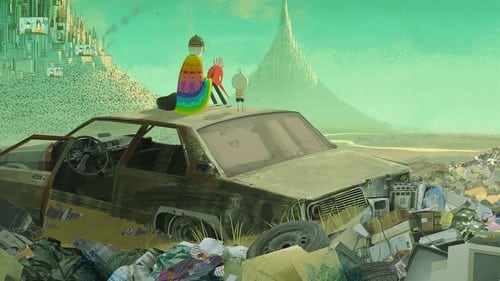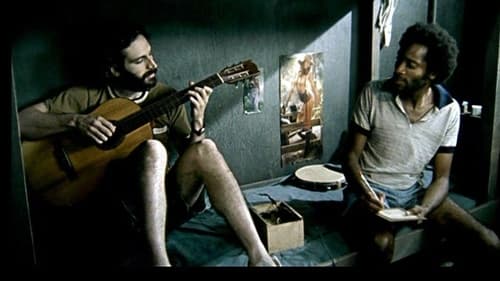Naná Vasconcelos
Рождение : 1944-08-02, Recife, Pernambuco, Brazil
Смерть : 2016-03-09

Himself
The personal trajectory and the international career of the singer, guitarist, and composer Badi Assad.

Music
Мультфильм повествует о мальчике по имени Кука, чья уютная жизнь рушится, когда его отец уезжает в город. Мальчик отправляется на поиски отца, движимый целью воссоединить свою семью.

Music
Part activist and part globe trekking photographer, Sebastião Salgado is most famous for recording the migration of people and culture around the world. In this extensive conversation, Sebastiao Salgado revisits his adventurous career via the breathtaking images he captured.

Music
Present in nearly all cultures and used for many purposes, drums have unique shapes, sounds, names and accents in each region of the world. Behind this vast legacy are individuals who play them and are touched by these ancestral instruments. From the rare budimas used by Tonga people in Zambia to the large drums of the Chinese temples, from the religious festivals of Brazil to the rhythmic richness of the Arab World, these men and women keep this tradition alive.

Self (archive footage)
This film documents in depth the life and artistic trajectory of the musician and poet Itamar Assumpção. He was one of the pillars of a moment of Brazilian popular music that was conventionally called "Vanguarda Paulista". Starting from extensive research which resulted in more than 250h of images and a dive into the personal universe of this incredible artist, Itamar comes up with a poetic, intuitive plot where facts and testimonies speak louder than preconceived ideas.

In the 1970s, in the midst of a military dictatorship, composer Jards Macalé and filmmaker Luiz Carlos Lacerda (Bigode) shared a house in Rio de Janeiro - which became a center of convergence for musicians, filmmakers and writers, and where they performed classic films and songs of Brazilian culture.

Ele mesmo
Brazilian outback, cowboys preserve their age-old customs, communicating with their cattle in a form of plaintive singing known as Aboio. The chant resounds an improvised, ancient form that is an entrance to the life and the imaginary of the ancient Brazilian cattle drivers.

Original Music Composer
The strange friendship between two men of opposite social classes. Miguel is a senator. His childhood friend Jorge is a major drug-dealer. In the 1970s, they meet in prison: Miguel was there for political reasons, and Jorge, as a common criminal.


Self
This is a journey of friendship, an Argentinian is going to rediscover his continent while searching for his friend from Bahia. And while the work, the records and the career of this great lady of Brazilian music are well known, the starting point, the training, the first years remained till now in a vaguely legendary and imprecise blur. Thanks to many investigations that concern as many places as times, thanks to journeys back in time through the towns and regions, the film seeks the origins of Maria Bethânia’s voice and style. Helped and led by Bethânia herself, with the assistance of Caetano Veloso and Chico Buarque, the two princes of Brazilian music, along with the complicity of the great Gilberto Gil, the author is allowed to go to the first context : the North-East. In the family home in Santo Amaro, the film finally touches the childhood of Maria Bethânia – and her brother Caetano, and this mysterious point – from which the music radiates.

Music
Inspired by the life of the french-born photographer and ethnographer, Pierre Verger, the movie follows his journey between Bahia, Brazil and Benin, Oriental Africa, showing places and people he met and his life study project: the Candomblé culture.

Music
On December 31st 1999, destiny brings a fugitive prisoner and a depressed middle class teacher together, as the new millennium approaches bringing hope to everyone.

Original Music Composer
Antero and Maria Araújo's story is the shortcut chosen by the director to show life in Maraima, a small town in the state of Ceará, Brazil, including life in community and the military influence. Maria wanders through the state praying to ward off the symbolical presence of the Dragon. That's when she finds Antero, an end-of-the-world prophet, who will join her in her pilgrimage and fight against the mythical being.

Self
Between August 23 and 31, 1983, at the "Circo Massimo", in Rome, there was a musical event that brought together artists from Bahia. This film brings a recording of the event, also featuring backstage, rehearsals, testimonies and some relaxing moments of these great names in Bahia's music.

Original Music Composer
In 1993, Sam Fuller takes Jim Jarmusch on a trip into Brazil's Mato Grosso, up the River Araguaia to the village of Santa Isabel Do Morro, where 40 years before, Zanuck had sent Fuller to scout a location and write a script for a movie based on a tigrero, a jaguar hunter. Sam hopes to find people who remember him, and he takes film he shot in 1954. He's Rip Van Winkle, and, indeed, a great deal changed in the village. There are televisions, watches, and brick houses. But, the same Karajá culture awaits as well. He gathers the villagers to show his old film footage, and people recognize friends and relatives, thanking Fuller for momentarily bringing them back to life.

Music
Widowed and broke Finnish businessman Kari takes his two teenage daughters with him to Brazil. A bush pilot introduces him to the idea of gold mining in the jungle, but a beautiful and educated local woman warns him about the possible consequences to the rain forest. Kari has mixed feelings about the project, until an accident puts him in the care of a local Indian tribe.

Music Arranger
A look at the Brazilian black movement between 1977 and 1988, going by the relationship between Brazil and Afrika.

Original Music Composer
A look at the Brazilian black movement between 1977 and 1988, going by the relationship between Brazil and Afrika.

Music
Galanga, king of Congo brought to Brazil as a slave, finds gold in Vila Rica, in the State of Minas Gerais, and buys his enfranchisement, the properties of his former owner, and his companions' freedom, becoming Chico Rei, the first black man to own lands in Brazil.

Music

Music
Four Third-World Christs try to stop the American industrialist John Brahms in Glauber Rocha's experimental film inspired by Pier Paolo Pasolini's murder.

Moki and Don Cherry met in the mid-1960s and soon began collaborating closely. They made happenings, music, art, posters and record sleeves, they performed together, organised workshops and toured. The film merges the different worlds they lived in – countryside and city life, and the various disciplines that were interwoven in their artistic practices. Some scenes also feature Eagle-Eye Cherry as a little boy and Neneh Cherry in her teens. Other musicians from that time include Collin Walcott, Rashied Ali, James Blood Ulmer and Naná Vasconcelos. Urban Lasson also appears in the film.

Music
Expedito, after being abandoned by his parents, became Zefa's adopted son until he became a man and started earning his living as an independent fisherman. As soon as he finds out that Zefa is very ill, Expedito runs back home and finds his adoptive mother in agony. At the edge of the bed, a mysterious woman, who claims to be Death, sits.




















